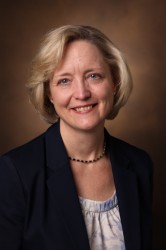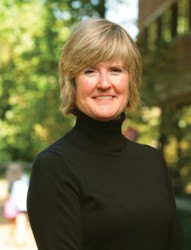Formed in 2009 and charged with reviewing and recommending campus strategies for preventing sexual misconduct, the Provost’s Task Force on Sexual Assault’s continuing contributions are reflected in a name change for the group.

The new name, the Provost’s Sexual Misconduct Prevention Committee, indicates the university’s and the committee’s ongoing commitment to campus safety, and to addressing this issue affecting campuses across the country.
“Preventing sexual misconduct is critically important,” said Provost and Vice Chancellor for Academic Affairs Susan R. Wente. “Vanderbilt deploys many resources toward this goal—among them is this group, which has played a significant advisory role in ensuring that our relevant campus offices and prevention programs are working effectively and cooperatively to promote a safe and secure environment for all students, faculty and staff.
“Initially formed as a task force, their name has been changed to reflect the ongoing, critical nature of their work during the past nine years. They are now a standing committee,” Wente said.
The committee’s membership includes faculty, staff and administrators from across the university’s schools and colleges. One of its most important roles is to serve as an information hub, sharing resources, data and best practices across the schools.
The committee’s work has included several significant advances in the university’s prevention efforts, including:
- Mandatory, in-person programming on sexual misconduct for all incoming first-year undergraduate students.
- Expanding the university’s online training module regarding sexual misconduct—that was initially piloted with first-year students—to upperclass students and graduate and professional students.
- Expanding the Green Dot bystander intervention training program for undergraduate students to include faculty, staff and graduate students.
- Implementation of a climate survey to inform Vanderbilt’s response to sexual misconduct. More than 11,500 undergraduate, graduate and professional students were surveyed about the prevalence of various types of sexual misconduct, whether and how incidents are reported, and their awareness and use of campus resources. The task force/committee developed a series of recommendations based on student survey responses that have been implemented by the university.
- Developing and implementing mandatory Title IX pre-departure training for international trip leaders.
Their work this academic year has largely focused on increased training for faculty regarding what constitutes sexual misconduct and the faculty’s role as mandatory reporters.

“We are a listening post for the Vanderbilt community, and through listening and learning, we are better positioned to inform and support efforts to prevent all forms of sexual misconduct across our campus. Our members continue to ask: Are we hearing from all campus stakeholders? Are we taking appropriate actions?” said Claire Smrekar, associate professor of public policy and education and chair of the committee.
“We know Vanderbilt is well-situated with resources, expertise and professional care services—just look at Project Safe, for example—but we continue to probe whether we have all the pieces and people in place to prevent, and respond to, incidences of sexual misconduct in this community.”
Faculty representatives on the committee are nominated annually by the academic deans of each of the colleges and schools. Faculty often will request to return to the committee for three to four years before rotating off. Administrative and staff representation includes the director of the Project Safe Center for Sexual Misconduct Prevention and Response, the Title IX coordinator, and senior associate general counsel as well as the vice provost for learning and residential affairs, dean of students, associate dean of students and a representative from the Graduate School.